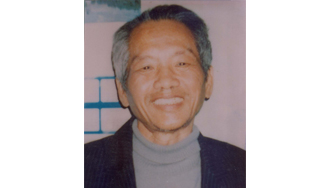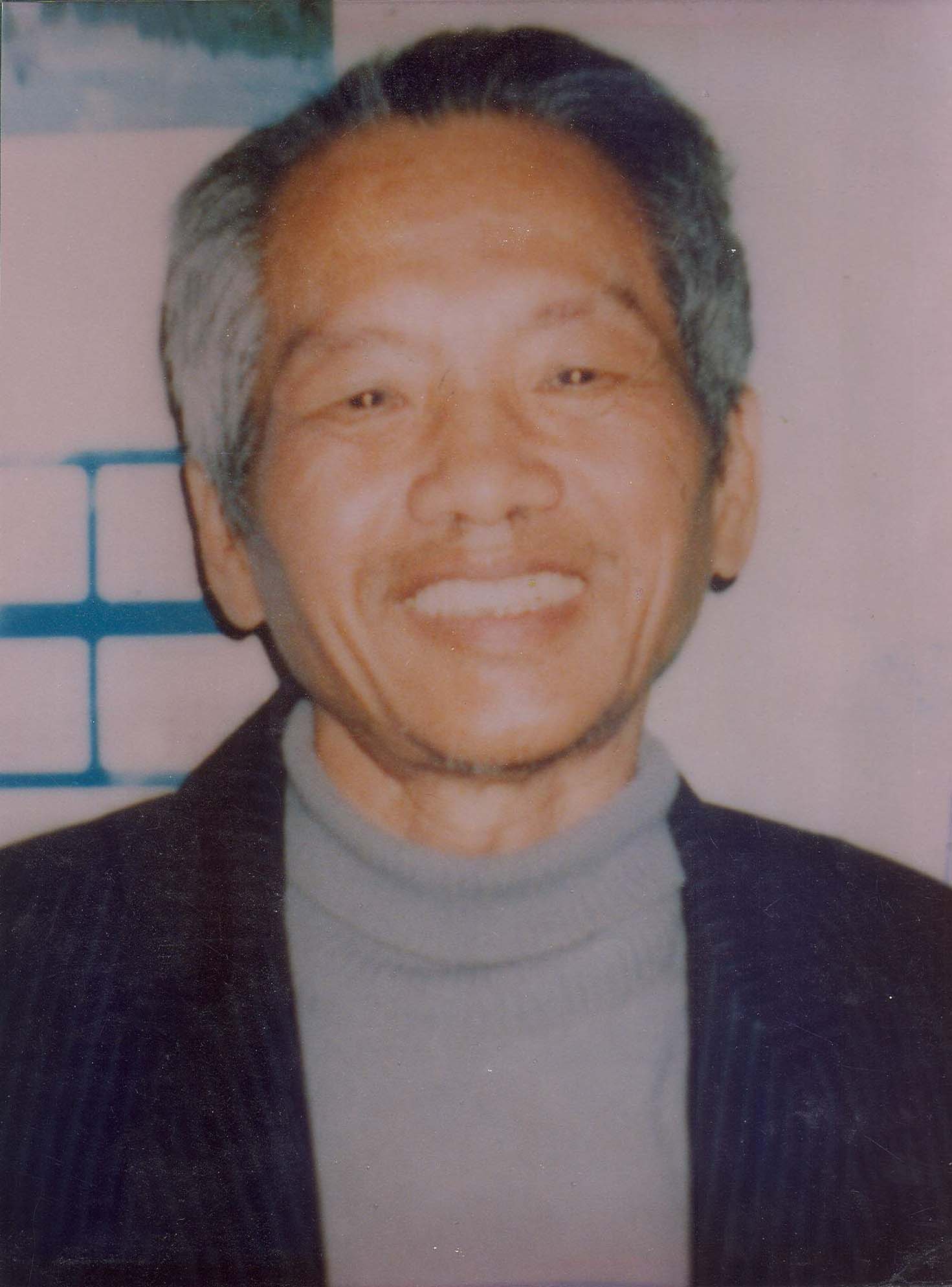
Vo Quang Nhon was born in 1929 in Quang Ngai. He graduated from Hanoi University in 1963, successfully defended his PhD thesis in Philology in 1982 and was awarded the title of Associate Professor in 1994.
For many years, at Hanoi University of Science, Vo Quang Nhon specialized in teaching folk literature of ethnic minorities in Vietnam. From 1981 onwards, he also took on the Southeast Asian literature curriculum. In terms of topics, from 1982, he presented lectures on the heroic epic genre; from 1985, he taught classes on schools of folk literature research.

Associate Professor, Doctor, Meritorious Teacher Vo Quang Nhon (1929-1995). He was a folk literature researcher and Head of the Department of Folk Literature (1990-1992).
In his youth, Vo Quang Nhon spent his life as a citizen and soldier in the Central Highlands battlefield. In 1948, after a period of working in the local youth movement, the young intellectual and party member Vo Quang Nhon “stepped on the clouds, his hair played with the mountain wind” and came to the Cheo Reo people (formerly part of Dak Lak province, now Ayunpa district, Gia Lai province) as a district political commissar. There, he wore a loincloth to clear the fields, sharpened spikes to kill the enemy, and sang and played with the people while trapping birds in the fields, celebrated Mnamthun festival in the village, and listened to the village elders tell stories in the communal house. Looking at the young man with dark skin, thick lips and stiff hair, the people of the Central Highlands forgot that he was a scholar who graduated from Thuan Hoa High School and thought he was the son of Bok Klang or a descendant of several generations of Dam San's uncle, Dam San's nephew... It was his blood relationship with the Central Highlands that gave him the knowledge and inspiration to compile the anthologies.Dam San Thi(1972),Folk tales of Southern ethnic groups(1976),Ca Tu Folk Tales(1978),Co Ho folk tales(1984, 1988) and especiallyCentral Highlands folk songs, 1976, 1986).
Whether the materials are collected by him or selected from previously published works, readers can still recognize Vo Quang Nhon's mark in them. For example,Dam Thiis a collection of stories for children compiled by him under the order of Kim Dong Publishing House. But he did not "copy the original" but told it vividly. The story both shows the nuances of the Central Highlands mountains and forests and is suitable for the thinking of school-age children. Or readCentral Highlands folk songs, even the most demanding person must admit the serious work and thorough understanding of Vo Quang Nhon in this case. The book is selected from many sources of materials. A few were collected by others and were carefully selected by him in terms of content and artistic quality. A very large number of works were collected by others and he coordinated the translation or editing. Here are also articles that he himself collected or translated into common language. In the current situation of the team of folklore scientists in our country, especially for those with degrees and scientific titles like Vo Quang Nhon, this is very rare.
Besides the main inspiration for the anthologies of folk tales and songs of the Central Highlands ethnic groups as a way to repay the gratitude to those who took care of him during the nine-year resistance war, Vo Quang Nhon also expanded his vision toProjection – Tay Folk Song(Viet Bac Ethnic Publishing House, 1972). This is the result of his work after a field trip to Cao Bang in 1977. Further, he reached out toFour Champa flowers(Lao Folk Tales, Kim Dong Publishing House, 1970) andHero Hong Kinh Ton,(Korean Folk Tales, Dong Thap Publishing House, 1989). These collections of stories not only help Vietnamese readers become familiar with the folklore heritage of neighboring countries in Southeast Asia and North Asia, but also form part of his future research direction.
In general, the collection, editing and compilation of folk literature works not only serves the readers but also is an organic part of the work of folk literature scientists. A long time ago, Professor Iu.M. Sokolov wrote: "It is necessary to consider as outdated the period when a folk literature researcher could not at the same time be a collector, directly surveying how fonclo exists in real life" (Russian folk music,From that perspective, Vo Quang Nhon is indeed a true folklorist. Each story and each folk song he conveys to readers and listeners is not just a dry text on the page but is filled with the warm breath of life and the excitement of cultural activities in villages and hamlets. It is from that reality that his later theoretical writings are not only not tainted by "gray" but are "fresh and green" like the tree of life.
Vo Quang Nhon's theoretical work is more convincing than his writings.Heroic epics of the ethnic groups in the Central Highlands of Vietnam(Literature Magazine, No. 4, 1987, pp. 5-21). This article is a developed summary of his PhD thesis which he successfully defended on March 22, 1982 at Hanoi University of Science. It can also be said that this article is the accumulation of knowledge he accumulated during his years on the battlefield and at school. There, we see that Vo Quang Nhon is not only a person who thoroughly understands epics from the mouths of village elders but also covers a large amount of collected documents and research works in Vietnamese, French and Russian. He analyzes the unique poetic system through the beautiful images, language, images, rhymes, music of the verses as well as the performance method of this genre. This is Vo Quang Nhon's paradise and also a forbidden garden for some others because few can overcome the language barrier. To conclude his article, Vo Quang Nhon turned to the typological method and called on colleagues to "place the research objects being mentioned on the typological comparison plane with the epics of related ethnic groups, especially in the Southeast Asian region".
Here we see that Vo Quang Nhon has gone beyond the level of a loyal secretary of the ethnic people of the Central Highlands, recording songs and stories to become a theorist of literature and folk culture. He is no longer a deer or a squirrel running around the fields but has transformed into an eagle soaring in the sky, casting his eyes in all four directions "looking North, looking South, looking at the whole globe" to have a view that is both specific and comprehensive. His ability is more clearly demonstrated in the university textbookFolklore of ethnic minorities in Vietnam(University and Vocational High School Publishing House, 1983, 475 pages). Up to now, this book is still a major milestone in systematically introducing the literary and cultural heritage of ethnic minorities in Vietnam. Therefore, its significance has gone beyond the scope of a textbook used in schools. It has become a reference book for those who need to receive the above-mentioned subjects. As Vo Quang Nhon wrote in the opening pages: "The textbook on folk literature of ethnic minorities in Vietnam is built according to the general direction of Vietnamese literary history, at the same time starting from the specific characteristics of the ethnic groups to highlight the contributions of ethnic minority literature to the general literature of the entire Vietnamese ethnic community" (p. 10). But achieving that goal is not easy because the folk literature of 50 ethnic minorities, in the words of poet Nong Quoc Chan, is “a garden of many fragrant flowers whose growing soil is extremely diverse. To overcome that difficulty, Vo Quang Nhon has turned to the method of comparative typology and history to find and explain “the close relationship between the general and the particular on the basis of taking the general of the entire Vietnamese community as the foundation, while paying due attention to the specific nuances of ethnic minorities” (pp. 10-11).
When talking about Associate Professor Vo Quang Nhon's contributions to the literature and folk culture of ethnic minorities in Vietnam, we cannot help but mention a number of his short, timely articles aimed at "praising and encouraging positive factors and criticizing and condemning negative, harmful manifestations in the fields of culture and arts".
Those are the articlesFolklore of ethnic minorities through the eyes of colonial researchers(1974),Folklore of ethnic minorities in the cultural plot of American imperialism(1991),The anti-Chinese expansionist voice of the Vietnamese ethnic family through folk literature(1983). These articles were published in certain political periods and contexts of the country. They demonstrate the civic consciousness of scientist Vo Quang Nhon. Up to now, many arguments in those articles are still hotly topical. We cannot help but criticize the lack of objectivity, dishonesty, and sometimes even intentional falsification of documents by some scholars who are also military supervisors, bishops or French administrators when collecting and publishing the cultural heritage of ethnic minorities and folk culture of ethnic minorities in the Central Highlands and Northwest of Vietnam. The use of literary materials and folk culture of ethnic minorities to serve the governing policy lasted until the period of American imperialism and the Southern puppet government. Therefore, the above articles by Vo Quang Nhon were necessary and had positive significance.
Before and after, readers have always loved Vo Quang Nhon for his sincerity and the purity of an intellectual who has followed the Party for many years. That respect has increased many times over for those who are close to Vo Quang Nhon, who have witnessed his dedication in thousands of university lectures, guiding hundreds of graduation theses for students and dozens of doctoral theses for postgraduates.
On January 27, 1995, teacher and scientist Vo Quang Nhon left this earthly world full of fate. But the Party, the State, and the scientific community never forgot him. On September 1, 2000, the President of the Socialist Republic of Vietnam signed a decision to award him the State Prize for his work.Folklore of ethnic minorities in VietnamNot only his soul in eternity but also the entire folk literature research community at home and abroad rejoice at this noble reward.
|
ASSOCIATE PROFESSOR, DOCTOR, MERITORIAL TEACHER VO QUANG NHON
+ Working unit: Faculty of Philology, Hanoi University of Science. + Management position: Head of Folk Literature Department (1990-1992).
Four Champa flowers(Lao folk tales, compiled). Kim Dong Publishing House, 1970. The Young Man(Folk tales of various ethnic groups, compiled). Kim Dong Publishing House, 1972. Folk tales of Southern ethnic groups(two volumes, selected and compiled). Culture Publishing House, 1975 - 1976. Central Highlands folk songs(compiled and introduced). Culture Publishing House, 1976; reprinted 1986. Co Tu folk tales(compiled, introduced). Culture Publishing House, 1978. Learn about Lao cultural historySocial Sciences Publishing House, 1982, volume II. Literature of ethnic minorities in Vietnam(University textbook). University and Vocational High School Publishing House, 1983. Folk culture. Folk Culture Department(under the Vietnam Social Sciences Committee) is responsible for publishing, 1982. Coho folk tales(compiled, introduced). Culture Publishing House, 1984; Reprinted 1988. History of Lao literature(compiled). Education Publishing House, Vientiane. 1985. Collection of folk tales of Vietnamese ethnic groups(editor, reference book, used in universities), 1988. Hero Hong Kinh Ton(Korean folk tales, compiled). Dong Thap Publishing House, 1989. Epic of the Central Highlands Heroes(co-authored). Education Publishing House, 1997.
+ State Prize for Science and Technology in 2000 for the projectFolklore of ethnic minorities. |
Author:Professor Le Chi Que